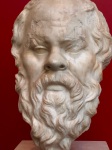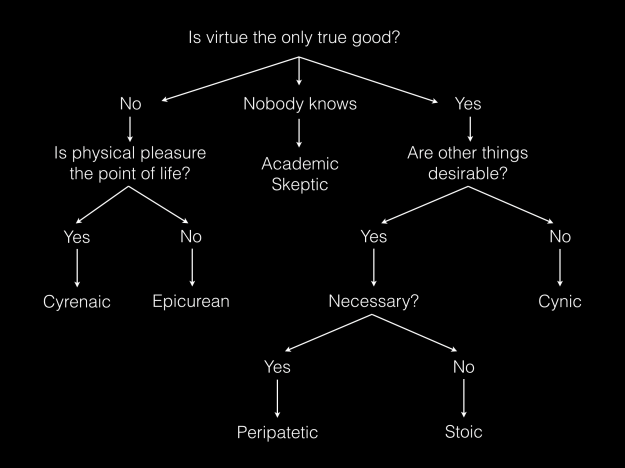The Hellenistic period, which is typically defined as going from the death of Alexander the Great (323 BCE) to the rise of the Roman Empire (marked by the battle of Actium, 31 BCE) saw the flourishing of a bewildering number of new philosophical schools, of which Stoicism was of course one. I have discussed the variety of these schools and their genealogical derivation from the thought of Socrates in a previous post, devoted more broadly to the differences between ancient and modern conceptions of ethics, and of course this very blog is an ongoing discussion and exploration of Stoicism in particular. But perhaps Stoicism isn’t quite for you, and yet you are still attracted to the idea of a eudaimonic life, a life spent in pursuit of something that makes it meaningful and worth living? Then you are in luck, because I’m about to introduce the Hellenistic Schools decision making tree!
The doctrines covered by the tree are Stoicism (of course), Cynicism, Peripateticism (i.e., Aristotle’s school), Academic Skepticism (from Plato’s Academy, but developed by Arcesilaus, Carneades, and Philo of Larissa), Epicureanism and Cyrenaism.
All of these schools, and other minor ones that are not covered here, were in fierce debate with each other during the Hellenistic period, vying for prominence in what John Stuart Mill later called the marketplace of ideas.
We actually have a sense of just how successful the various approaches were, thanks to a quantitative study of recorded membership in the different schools, published by Richard Goulet as a contributed chapter to Ancients and Moderns: Essays in Honor of Pierre Hadot, edited by Michael Chase, Stephen R. L. Clark and Michael McGhee. The chapter entitled “Ancient philosophers: a first statistical survey,” is behind a paywall, but a summary of the content can be found here.
The highlight is that the ranking of the various schools was, in decreasing order: Platonists (19% of named philosophers, but not just from the Skeptic period), Pythagoreans (13%, though their influence waned very quickly, before the onset of Hellenism), Stoics (12%), Epicureans (8%), Peripatetics (6%), Socratics (5%, this is really a generic container for “none of the above”), and Cynics (3%).
But of course one wouldn’t just want to pick a school because it was the most popular (or, if one is prone to going against the flow, the least popular), right? Hence this handy decision making tree. I offer it, it should go without saying, as a very rough first approach, it is most definitely not a substitute for engaging in serious study, or at the least perusing some introductory texts on each of the named schools (see below for suggested readings):
As you can see, the first question to answer is whether you think that virtue is the only true good, meaning the only thing that is good regardless of circumstances. Money, for instance, may be good or bad, depending on the use one makes of it. And Socrates argued (in the Eudythemus) that wisdom — the chief virtue, of which all other virtues may be thought of as aspects — is the only thing that can never be used for ill, and thus qualifies as the chief good.
This is the only question in the decision making tree that leads to a trichotomy: if your answer is that nobody really knows, then you are an Academic Skeptic (and I’m not sure how your epistemic agnosticism is going to guide you through life). If you go for no, then you descend down the hedonic branch; and if you answer yes then you go down the virtue branch.
(Obviously, hedonism isn’t the only conceivable alternative to virtue, but in the specific context of the Hellenistic philosophies it was.)
Let’s take the no first. Now you face a second question: is the highest good to be found in physical pleasure? If you say yes, then you will be comfortable with the philosophy of Aristippus of Cyrene. The Cyrenaics thought that pleasure, and in particular physical pleasure, was the thing to live one’s life for. That said, they still exercised virtue, since they taught that you ought to own pleasure, not the other way around. Which means no excesses, and no addictions.
If your answer is no, but you still think pleasure, rather than virtue, is the highest good, then you are an Epicurean. Epicureans, however, were not the “sex drugs and rock ‘n’ roll” sort of depraved fellows that the Christians later painted them to be. Their main goal was to avoid pain (both physical and emotional), which means that they withdrew from social engagement and especially political life, spending their time with close friends, enjoying the simple pleasures in life, like good company and wholesome meals.
Let’s move back up again and see what happens if your answer to the first question is positive. The next node then concerns whether things other than virtue are desirable. If you say no, then you are a Cynic, and good luck with that. Even though Epictetus famously thought that if you can’t be a Cynic, at the least you can try to be a good Stoic, meaning that Cynicism was, in his opinion, the highest form of philosophy, you will need to be prepared to live a very minimalist life. The sort of minimalism that includes throwing away the cup in which you drink water and using your hands instead, as Diogenes of Sinope famously did.
If your answer instead is that, while virtue is the chief good, there are other things in life too, then you need to decide whether those things are necessary for a eudaimonic path, or just optional. If necessary, you are an Aristotelian, and also a bit of an elitist — since Aristotle thought that the good life had to include some wealth, good health, education, and even good looks. Everyone else is pretty much barred by circumstances from becoming eudaimon.
Finally, if you think that virtue is crucial, but that other things are welcome (preferred) or should be avoided (dispreferred), so long as they don’t get in the way of virtue (they are “indifferent” to it) then you are a Stoic. Needless to say, and given the title of the blog you are reading, that’s my own philosophy of choice.
_____
Resources on the Hellenistic schools (in strict alphabetic order):
Academic Skepticism
Cynicism
Cyrenaism
Epicureanism
Peripateticism
Stoicism



Massimo,
You’ve got the two “Philosophy as a Way of Life” volumes mixed up! The one with Goulet’s essay is subtitled “Ancients and Moderns: Essays in Honor of Pierre Hadot,” and it’s edited by Michael Chase, Stephen R. L. Clark andMichael McGhee (https://www.amazon.com/Philosophy-Way-Life-Ancients-Moderns/dp/1405161612).
The one you link to is “Spiritual Exercises from Socrates to Foucault,” which is edited by Davidson and contains only essays by Hadot himself.
LikeLiked by 1 person
Thanks Eric, I’ll correct it!
LikeLike
My guess is, that most of the modern society values things, one can buy with money, much higher as both pleasure and virtue. Otherwise I can’t explain the amount of suffering, greed, hypocrisy and cowardice which most people are ready to endure to buy the new shiny thing or yet bigger house. Just curious if there was/is a philosophical school for someone who values materialistic things above all else.
LikeLiked by 1 person
Senseless materialism might well be what philosophical schools developed in reaction to, more than anything.
LikeLike
Tim,
The Cyrenaics were definitely the Hellenistic version of a materialist school. But even they were far more virtues of most modern materialists.
LikeLike